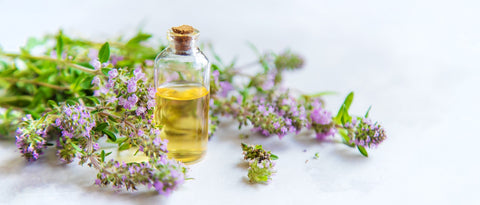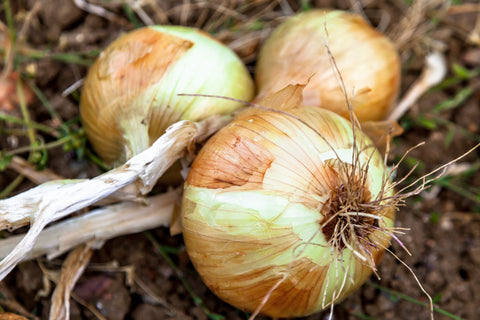When a sore throat strikes, it brings with it its share of discomfort: difficulty swallowing, sharp pain, and sometimes a hoarse voice that signals our distress with each word spoken.
This universally dreaded symptom can have multiple origins, ranging from seasonal changes to viral infections, exposure to allergens or too dry air.
In the quest for relief, many people turn to medicine cabinets, looking for a quick solution (syrups, painkillers, local anesthetics, etc.). However, history and traditions have left us with a wealth of knowledge about more gentle and natural approaches. 🌿
In a world where interest in well-being solutions from nature continues to grow, rediscovering these 100% natural sore throat remedies represents a path that is both promising and reassuring!
Understanding sore throat

Before diving into the world of natural remedies , it is crucial to understand what sore throat is and what causes it.
Often perceived as a simple annoyance, a sore throat is actually a symptom indicating inflammation or irritation of the throat.
The causes are multiple:👇
- Viral infections like colds or flu,
- Bacterial infections such as strep throat,
- Allergens,
- dry air,
- Pollution,
- Smoking,
- Vocal overwork.
It is also important to note that a sore throat can be a symptom of other illnesses, such as mononucleosis, laryngitis, lower respiratory tract diseases, or certain gastrointestinal conditions. In these cases, treating the underlying problem is essential to resolving the sore throat.
The presence of certain signs, such as a high fever , difficulty breathing or swallowing , rash , or prolonged duration of sore throat, suggests that it is time to see a healthcare professional . This step is crucial to rule out more serious conditions and to get advice tailored to your situation.
So, although sore throat is a common experience, its varied causes require a thoughtful approach in choosing remedies.
7 natural remedies for sore throat

Discover our selection of the 7 best grandmother's remedies, 100% natural , to quickly relieve a sore throat.
1. Honey and lemon
The honey 🍯 and lemon 🍋 duo is an ancestral classic to counter sore throats, combining the calming and healing properties of honey (1–3) with the antiseptic and revitalizing effect of lemon.
Honey, particularly thyme, eucalyptus, manuka, lavender or fir honey, offers a natural dressing for irritated throats, while lemon boosts immunity thanks to its richness in vitamin C.
To benefit from their benefits, consider consuming honey pure, incorporating it into infusions, or using a mixture of honey, warm water and lemon juice for soothing gargles.
Please note, honey is not recommended for children under one year old, diabetics, or those allergic to bee products.

2. Gargles
Gargling offers an effective and direct way to relieve throat inflammation and pain, while rehydrating the mucous membranes.
Here are some simple solutions to try, depending on your preferences or the need to alternate:
👉 Salt water 🌊: Dissolve half a teaspoon of salt (preferably Dead Sea salt for its minerals) in a cup of hot water. Let it cool before gargling three to four times a day. This mixture helps eliminate secretions, rehydrate mucous membranes, and fight bacteria.
👉 Baking soda : mix a teaspoon of baking soda in a glass of water until completely dissolved. Gargling with this solution reduces irritation and neutralizes bacteria.
👉 Apple cider vinegar : add a teaspoon of organic cider vinegar to a cup of lukewarm water. Gargle regularly throughout the day. This practice contributes to the elimination of secretions and bacteria while strengthening the immune system.
👉 Lemon : squeeze the juice of half a lemon into a large glass of water for gargling which can be done frequently throughout the day, to calm inflammation.
These methods are generally safe for everyone, including pregnant women, nursing mothers, and children over 3 years old, as long as they are able to gargle without swallowing the solution.
However, it is recommended to supervise children during this practice to ensure their safety.

3. Marshmallow Root (Althaea officinalis L.)
Boasting antitussive, expectorant, and anti-inflammatory properties, this plant can be infused by placing a teaspoon of dried root in a large cup of cold water, brought to a boil then left to sit for 10 minutes. Consume it several times a day (1 to 3 cups).
Please note, this decoction should be avoided for children under 3 years old.
4. Thyme (Thymus vulgaris)
With its antibacterial and decongestant properties (4), one teaspoon of dried thyme per cup of simmering water, infused for ten minutes, can be consumed three times a day. Adding honey can increase its benefits.
Use limited for pregnant women to one cup per day and not recommended for children under 2 years old.

5. Lavender (Lavandula angustifolia)
Lavender is known for its calming effects exploited in various ailments (5). For a sore throat, pour 2 g of dried lavender flowers into a cup of simmering water, steep for 10 minutes, and drink up to 3 cups per day.
This herbal tea can induce drowsiness. So avoid consuming it if you want to stay vigilant and prefer thyme herbal tea.

6. Essential oils
To alleviate sore throats, essential oils prove to be valuable allies thanks to their varied therapeutic properties. Here's how to safely integrate them into your skincare routine:
Peppermint (Mentha piperita)
Orally : one drop in 1 teaspoon of honey or on a piece of sugar, taken 3 times a day for a maximum of 5 days.
Cutaneously : dilute to 20% with a vegetable oil for application to the thorax twice a day, for a maximum of 5 days.
Inhaled : put 5 drops in a bowl of hot water, place your face above it, close your eyes and breathe in the vapors (twice a day). You can put a towel on your head to optimize the operation.
Warning: unsuitable for children under 6 years old, pregnant or breastfeeding women, and people with epilepsy or allergies.
Tea tree (Melaleuca alternifolia)
Orally : a drop of tea tree essential oil in a little honey or sugar, 3 times a day for 5 days is enough to soothe a sore throat.
Cutaneously : two to three drops mixed with a vegetable oil for massage on the thorax and neck lymph nodes, 2 to 3 times a day for 5 to 6 days.
Inhaled : five drops in a bowl of hot water, to breathe up to 3 times a day.
Warning: Not recommended for children under 3 years old and during the first three months of pregnancy.
Thujanol thyme (Thymus vulgaris CT thujanol)
Orally : one drop in honey or sugar, three times a day.
Cutaneous : diluted to 20% in a vegetable oil for massage on the neck and thorax, 2 to 3 times a day.
Inhaled : a few drops of essential oil (5 drops) in a bowl of hot water for inhalation 2 to 3 times a day.
These recommendations allow you to exploit the benefits of essential oils while respecting essential precautions for safe use.

7. Onion
The onion 🧅, this veteran among grandmother's remedies for sore throat, is praised for its multiple therapeutic virtues, notably its natural antibacterial properties (6–8).
Thanks to its anti-inflammatory, antibacterial, antiseptic and antioxidant properties, it effectively helps soothe irritation of the mucous membranes of the throat and strengthen immunity.
Here are some ways to use onion to combat sore throat:
👉 In juice form : Consume it raw, extracting the juice and mixing it with the juice of a sweet fruit, such as apple, to soften the taste.
👉 Infusion : Infuse pieces of onion for 5 to 10 minutes in a cup of hot water. You can drink this infusion 1 to 3 times a day to benefit from its soothing effects.
👉 Cooking : Incorporate onion into your meals, for example, by preparing a nourishing and comforting onion soup.
To maximize the benefits and minimize exposure to chemical substances, it is advisable to opt for onions from organic farming. The use of onion to relieve sore throat is suitable for children (provided they like the taste) and pregnant women, making it a family remedy par excellence.

Boost your immunity with food supplements
Strengthening your immune system is essential to effectively combat sore throats (most often of infectious origin, especially viral).
Vitamins, minerals and trace elements play a crucial role in this process, and although our daily diet provides a good part of them, food supplements and certain “ superfoods ” can be of great help in maximizing them. contributions.
Here are some suggestions to boost your immunity: 🛡️
Vitamin C
Known for its antioxidant properties and its vital role in supporting the immune system. Integrate it into your diet via citrus fruits, kiwis, broccoli, or opt for our Ócerola supplement rich in vitamin C (9–11).
Magnesium
This essential mineral plays a key role in supporting the immune system, helping to fight infections that can cause sore throats. By regulating the body's inflammatory reactions, magnesium can also help reduce the inflammation and pain associated with a sore throat. In addition, it promotes better nights' sleep, essential for recovering well and relieving the symptoms of sore throat.
Turmeric
This natural anti-inflammatory is an effective immune stimulant. Use our food supplement based on Curcumin to calm inflammation in your throat while boosting your natural defenses (12,13).
Propolis
A true natural antibiotic, Propolis boosts immunity and soothes irritated throats thanks to its antiseptic, antibacterial, and anti-inflammatory properties (14–16). 🐝
Royal jelly
This superfood, rich in nutrients, strengthens immunity, fights fatigue and soothes inflamed throats. Consume on an empty stomach, in pure form or diluted in honey, in 3-week courses for optimal effectiveness (1,3,17).
General steps to take if you have a sore throat

👇 Here is a list of good actions to take in case of a sore throat : 👇
- Drink lukewarm water or herbal teas to keep your throat hydrated.
- Eat foods that are easy to swallow like soups or purees.
- Avoid speaking loudly or shouting so as not to further irritate your throat.
- Use a humidifier to keep the air in your environment moist.
- Avoid tobacco and smoky environments which can make irritation worse.
- Stay away from strong perfumes and chemicals.
- Use softening tablets to soothe the pain.
- Wash your hands regularly to prevent the spread of viruses.
- These simple actions can help relieve your sore throat quickly.
Conclusion
Natural remedies offer us a range of effective and gentle solutions to relieve our sore throats.
From the judicious use of honey and lemon to soothing gargles, including the benefits of essential oils and the importance of boosting one's immunity with food supplements , these ancestral methods prove to be valuable allies in the fight against discomfort.
Remember, however, that consulting a healthcare professional is essential in the event of persistent, severe or unusual symptoms.
Adopt these tips and good actions for a rapid recovery and renewed well-being! ❤️
FAQs
What is sore throat?
It is a symptom of irritation or inflammation of the throat, often caused by infections, allergens or dry air.
Can you use honey and lemon for sore throat?
Yes, except for children under one year old, diabetics, and people allergic to bee products.
Are gargles effective for sore throats?
Yes, especially with salt water, baking soda, apple cider vinegar or lemon, but do not swallow the solution.
What are the benefits of essential oils for sore throat?
They offer antibacterial and anti-inflammatory benefits. Use as recommended to avoid risks.
References
- Domerego R, Imbert G, Blanchard C. Bee remedies: discover all the health benefits of beehive products!: [honey, pollen, propolis, royal jelly] [Internet]. Alpen Editions Sat; 2006 [cited March 17, 2024].
- MOLODOI O. The benefits of honey. 2009 [cited March 17, 2024].
- Alexandre MC. Honey, Propolis, Royal Jelly: Bees, allies of our immune system. [cited March 17, 2024].
- Sara O. Thyme: antimicrobial characteristics and effects. 2017 [cited March 17, 2024].
- Boutahiri S. Development of antidiabetic and antibacterial food supplements based on Moroccan lavender [Internet] [PhD Thesis]. University of Lille (2022-....); 2022 [cited March 17, 2024].
- Zine M, Amouri M. Evaluation of the antibacterial and antioxidant activity of polyphenolic extracts from Allium cepa [Internet] [PhD Thesis]. Faculty of Natural and Life Sciences; 2021 [cited March 17, 2024].
- HADRI DC, HACINE M, ABED Z. Phytochemical study and evaluation of biological activities of onion (Allium cepa) and garlic (Allium sativum) [Internet] [PhD Thesis]. Ibn Khaldoun University; 2023 [cited March 18, 2024].
- Briber N, Amira WE. Antioxidant and antibacterial activity of the Allium cepa plant [Internet] [PhD Thesis]. University of Jijel; 2020 [cited March 18, 2024].
- Tagliante É. Micronutrients and immunity. 2022 [cited March 19, 2024];
- Chambial S, Dwivedi S, Shukla KK, John PJ, Sharma P. Vitamin C in Disease Prevention and Cure: An Overview. Indian J Clin Biochem. Oct 2013;28(4):314‑28.
- Carr AC, Maggini S. Vitamin C and immune function. Nutrients. 2017;9(11):1211.
- Jantan I, Rouhani AS, Sumantri IB. Immunomodulatory effects and mechanisms of turmeric species and their bioactive compounds: A review. Front Pharmacol. 2021;12:643119.
- Chandrasekaran CV, Sundarajan K, Edwin JR, Gururaja GM, Mundkinajeddu D, Agarwal A. Immune-stimulatory and anti-inflammatory activities of Curcuma longa extract and its polysaccharide fraction. Pharmacogn Res. 2013;5(2):71.
- Sforcin JM. Propolis and the immune system: a review. J Ethnopharmacol. 2007;113(1):1-14.
- Hayriye ALP. Effects of propolis on immune system. Anadolu Ege Tarımsal Araşt Enstitüsü Derg. 2018;28(2):99‑104.
- Al-Hariri M. Immune's-boosting agent: Immunomodulation potentials of propolis. J Fam Community Med. 2019;26(1):57-60.
- MOUTH L. Royal Jelly: Uses, Side Effects, Interactions, Dosage and Warnings. [cited March 19, 2024];




